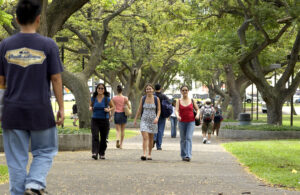Technology and institutions coevolve. Institutions can encourage or discourage innovation and adoption of technologies. Technological change, in turn, can drive institutional change. This dynamic has reached a critical phase in the electricity sector where low-cost and subsidized intermittent renewable energy is upsetting old models of grid management and stability. The broad public challenge, in Hawaiʻi and elsewhere, is to achieve power systems with a large share of renewable energy at the lowest possible cost while giving careful attention to matters of fairness.
The conference focuses on the institutional changes needed to accomplish this. The invited scholars, practitioners and policy makers come from the Islands, the Mainland and internationally. This website provides an overview and will be the forum through which its results can be widely distributed and discussed.
Download the Governing Green Power Conference Report (pdf)
| Monday – March 27, 2017 | |
| 6:00 – 8:00pm | Welcome Reception |
| Tuesday – March 28, 2017 | |
| 8:00-9:00am | Breakfast |
| 9:00-10:15 | Session I: Welcome, Introductions, Conference Goals and Process |
| 9:00-9:05 | Dick Pratt: Welcome |
| 9:05-9:20 | Michael Roberts: Motivation and goals for the conference. Although clean energy goals themselves are an important part of debate, we want to put that issue aside and focus on how the institutions themselves need to change to make the overall system more efficient and more equitable. |
| 9:20-9:30 | Brief introductions by everyone (10 seconds or less) |
| 9:30-9:40 | Governor’s remarks |
| 9:45-9:55 | Dick Pratt: Outline of conference process and schedule |
| 9:55-10:15 | What each participant sees as the most important issue or issues |
| 10:15-10:30 | Break |
| 10:30-11:50 | Session II: What are the Benefits if We “Get it Right” and the Consequences if We Don’t? Dynamic, marginal-cost pricing and open access to the grid can lower costs and help integrate renewables; without them, we could have grid defection, and spiraling costs for those who cannot defect. Facilitator: Dick Pratt, UHM, Social Sciences, Senior Adviser on International and Community Programs Presenter: Michael Roberts, UHM Economics, Sea Grant, and UH Economic Research Organization Primary Responders: · Duncan Callaway, UC Berkeley Energy and Resources Group · Maria Tome, Hawaiʻi Public Utilities Commission · Richard Barone, Hawaiian Electric Company · Severin Borenstein, UC Berkeley Haas School of Business and Energy Institute Wrap-Up: Richard Newell, Resources for the Future and Duke University |
| 12:00-1:20pm | Lunch |
| 1:30-3:00 | Session III: Current Institutions and Challenges with Intermittent Renewables What currently works, what doesn’t, and why? Investment-based profit motives of utilities can conflict with more efficient solutions centered on demand-response. Transmission, distribution, generation, storage and demand response are not optimally balanced and integrated. Facilitator: Meredith Fowlie, UC Berkeley Agricultural and Resource Economics and Energy Institute at Haas Presenter: Matthias Fripp, UHM College of Engineering and UH Economic Research Organization Primary Responders: · Matthew White, ISO New England · Steven Puller, Texas A&M University – Economics · Carl Freedman, Haiku Design and Analysis · Jay Griffin, Hawaiʻi Natural Energy Institute |
| 3:00-3:20 | Break |
| 3:20-4:50 | Session IV: Markets and Natural Monopolies: How has Technology Changed the Case for Regulation? Natural monopoly in generation diminished decades ago, but market power still exists in transmission and distribution. To what extent have renewable energy and complementary technologies changed the degree and nature of natural monopoly, and therefore the overarching case for regulation? If we look 5-10 years out, does natural monopoly diminish or disappear? Facilitator: Makena Coffman, UHM Urban and Regional Planning and UHERO Presenter: Severin Borenstein, UC Berkeley Haas School of Business and Energy Institute Primary Responders: · Richard Newell, President, Resources for the Future and former head of Energy Information Administration · Nori Tarui, UHM Economics and University of Hawaiʻi Economic Research Organization · Stephen Holland, UNC Greensboro Economics · Jim Alberts, Hawaiian Electric Company · Terry Boston, former CEO and President of PJM Interconnection Wrap-up: Marc Matsuura, Hawaiʻi Natural Energy Institute |
| 5:30-8:00 | Dinner Reception at College Hill |
| Wednesday – March 29, 2017 | |
| 8:00-8:30am | Breakfast |
| 8:30-10:00 | Session V: Institutional Changes in Response to Renewables: How are Technology and Institutions Co-Evolving? How have institutions already changed as a result of renewables? What are the consequences of these changes? Have the changes worked as intended? What are the unintended consequences? Facilitator: Dick Pratt, UHM, Social Sciences, Senior Adviser on International and Community Programs Presenter: Terry Boston Former CEO and President of PJM Interconnection Primary Responders: · James Bushnell, UC Davis Economics · Dave Parsons, Hawaiʻi Public Utilities Commission · Isaac Moriwake, Earthjustice · Mike Yamane, Kauaʻi Island Utility Cooperative · Regina Finn, Lucerna Partners Wrap-Up: Richard Wallsgrove, Blue Planet Foundation |
| 10:00-10:20 | Break |
| 10:20-11:50 | Session VI: New Ideas for Making Market-Based Power Systems Work Better with Renewable Energy Electricity markets continue to evolve, in part to deal with issues of market power, and in part because renewable energy is causing greater price variability. What can be done to make these markets work more efficiently? How can generation be better integrated with transmission, distribution, and demand response? Facilitator: Meredith Fowlie, UC Berkeley Agricultural and Resource Economics and Haas Energy Institute Presenter: Steven Puller, Texas A&M University Economics Primary Responders: · Regina Finn, Lucerna Partners · Kyle Datta, Ulupono Initiative · Matthew White, ISO New England · Alex Papalexopoulos, ECCO International, Inc. · Matthias Fripp, UH Mānoa Engineering and University of Hawaiʻi Economic Research Organization Wrap-Up: Carl Bonham, University of Hawaiʻi Economic Research Organization |
| 12:00-1:20pm | Lunch |
| 1:30-3:00 | Session VII: New Ideas for Utility Regulation with Renewable Energy How can incentives be improved? Some propose performance contracts with utilities, and these exist in certain capacities. What metrics ought to be used? Are alternative organizational structures, like government municipalities or cooperatives, any better? Are market-oriented solutions possible at the distribution level or for smaller grids like Hawaii’s? If so, how? Facilitator: Makena Coffman, UHM Urban and Regional Planning and UHERO Presenter: Alex Papalexopoulos, ECCO International, Inc. Primary Responders: · Meredith Fowlie, UC Berkeley · Michael Roberts, UHM Economics, Sea Grant, and UHERO · Terry Surles, Hawaiʻi State Energy Office · Duncan Callaway, UC Berkeley Energy and Resources Group · Mark Duda, Hawaiʻi PV Coalition · Dean Nishina, Hawaiʻi Division of Consumer Advocacy Wrap-Up: Rene Kamita, Hawaiʻi Division of Consumer Advocacy |
| 3:00-3:20 | Break |
| 3:20-5:00 | Session VIII: Transitioning to a Fairer and More Efficient System: Is there a QWERTY problem? Who gains and who loses if we transition to Utility 2.0? How are interests changing and evolving (e.g., utilities, customers, demand-response aggregators, ISOs, clean energy and storage companies)? Can these interests coalesce around a transition to fairer and more efficient governance systems? Can we anticipate where the conflicts will occur and what is the best strategy for reconciling differences? Facilitator: Dick Pratt, UHM, Social Sciences, Senior Adviser on International and Community Programs Presenter: Carl Freedman, Haiku Design and Analysis Primary Responders: · Mina Morita, Energy Dynamics · Katrina Jessoe, UC Davis Agricultural and Resource Economics · Beia Spiller, Environmental Defense Fund · Douglas Codiga, Schlack Ito · Scott Seu, Hawaiian Electric Company Wrap-Up: Mark Glick, Hawaiʻi Natural Energy Institute |
| Thursday – March 30, 2017 | |
| 8:00-9:00am | Breakfast |
| 9:00-11:00 | Session IX: Summary and Next Steps We will elicit feedback to a summary of key points from conference sessions, then turn to a discussion of where we go from here. What are the critical questions that require theoretical or empirical answers and how should academic researchers go about answering them? What should policymakers do and when should they do it? A summary report about the conference will be available on this website as soon as possible after its conclusion. |
Conference Sponsors
- Blue Planet Foundation
- Carlsmith Ball
- Collaborate Leaders Network Hawaiʻi
- College of Engineering, UH Mānoa
- College of Social Sciences, UH Mānoa
- Department of Economics, UH Mānoa
- Hawaiʻi Energy Policy Forum, UH Mānoa
- Hawaiian Electric Company
- Hawaiʻi Natural Energy Institute, UH Mānoa
- Sea Grant, UH Mānoa
- The Sierra Club
- UH Economic Research Organization
- UH Sustainability Office
- Ulupono Initiative
Suggested Readings
General Interest:
- Perez-Arriaga and C. Knittel: Utility of the Future. MIT (2016).
- Berkeley Energy Institute blog.
- P. Joskow: Creating a Smarter U.S. Electricity Grid Journal of Economic Perspectives Volume 26, Number 1 Winter 2012 Pages 29–48.
- J. Lazar: Electricity Regulation in the US: A guide Second Edition The Regulatory Assistance Project (2016).
- J. Lazard: Lazard’s Levelized Cost of Energy Analysis – Version 10.0.
- M. Pollitt: Lessons From the History of Independent System Operators in the Energy Sector, With Applications to the Water Sector. University of Cambridge – Electricity Policy Research Group (August 2011).
- R. Walton: How Regulations and Technology Brought Us Closer to Utility 2.0 in 2016. Utility Dive (Dec. 2016).
Hawaiʻi Focused:
- M. Fripp: Making an Optimal Plan for 100% Renewable Power in Hawaiʻi – Prelilminary Results From the SWITCH Power System Planning Model. (January 2016).
- UHERO Sustainable energy blog series.





